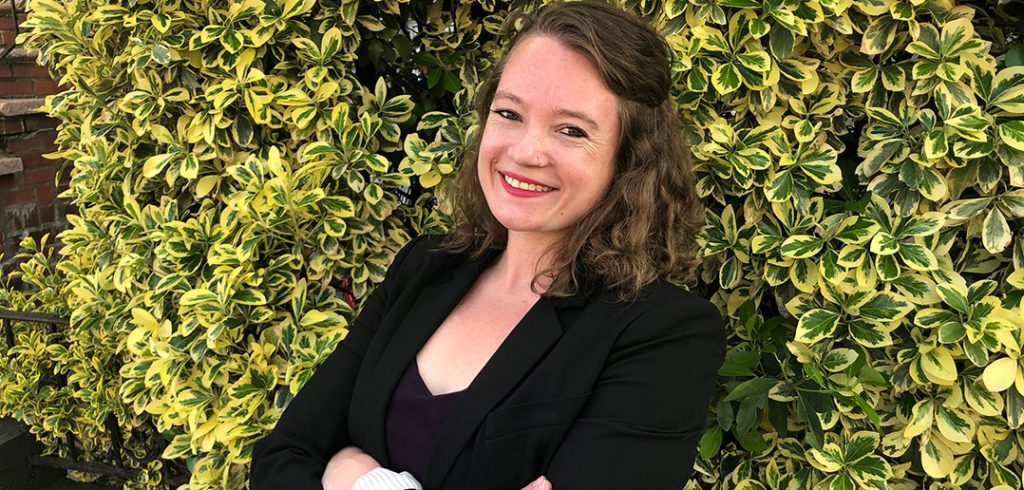“Growing up, I was consistently faced with situations where we had less than my peers had or where systems at school were set up so that you had to pay for particular activities, and they had very few students [like us]who couldn’t pay,” she said.
“I had access to a lot of privileged stuff, but at the same time, I think that early experience prepared me for an interest in advocating for people who not at the top of the food chain.”
After high school Chamberlain went to Barnard College, where she earned an undergraduate degree in anthropology in 2012. She worked as a paralegal at a firm before landing a position in 2015 with the Legal Aid Society’s health law unit. Working with clients who were sorting out issues related to Medicaid changed her view of what law can do for people, she said.
“Pretty much every client I had would call and say, ‘Thank you for dealing with this issue. I’m also having a problem with my food stamps.’ Or ‘I’m also having an issue with my apartment.’ Or ‘I’m having an immigration problem, can you help?’ It was really incredible to be able to say, ‘Yes, we actually do that too,’” she said.
She enrolled in Fordham Law two years later, and this spring, she will graduate as one of the school’s prestigious Stein Scholars. Pending her passing of the New York State Bar Exam, she will return to the Legal Aid Society in the fall to work in the organization’s housing rights unit.
“I wanted to stay in New York City, and I wanted to do something that would really make an immediate impact in people’s lives, so housing law actually stood out as a realm where you can do that as a brand new law grad,” she said, noting parallels to her work with Medicaid recipients.
“It ended up being a logical conclusion to this path that I’d taken, because even though it’s not health related, it is in a way, right? Because if you’re not healthy, it’s harder to find a place to live.”
During her time at Fordham Law, Chamberlain worked for the Legislative and Policy Advocacy Clinic and for the first-year legal writing program as a teaching assistant. She also did a summer internship at for the Center for Reproductive Rights. In an article published last year in the Fordham Law Review, she argued for repealing a 2017 anti-sex-trafficking law called the Allow States and Victims to Fight Online Sex Trafficking Act. In addition to failing to protect victims of sex trafficking, she argued that it punishes adults seeking to engage in consensual sex work.
“It’s a really interesting issue because it does implicate a group of people that have been pretty consistently maligned by society. In my opinion, everyone deserves certain fundamental rights, and everyone deserves basic dignity,” she said.
Aisha Baruni, director of counseling and public interest scholars, said Chamberlain has had a tremendous impact on the Stein Scholars program since she started. Most recently, she created a guide that rising 2L students in the program can consult to get a better sense of what to expect.
“She didn’t just come and tell me, ‘This needs to be done, and you should do it.’ She just did it and distributed it among her classmates. If it were on Yelp, it would get five stars. It got raves,” she said.
“It’s just an incredible thing to do—to see something that would be helpful only to others, and wasn’t something that she needed at all, and to gather information from upper class Stein Scholars to try to make the experience better for 1Ls and 2Ls.”
Housing rights are human rights, Baruni noted, and Chamberlain’s dedication to improving life for those in underserved communities is particularly relevant in New York City.
“The work she’s going to be doing is absolutely essential to help ensure that families living in affordable housing can remain in that housing,” she said.
“The Legal Aid Society is really fortunate to have her, because she’s is so deeply committed to this work. It’s not a trend, it’s her purpose.”
In some ways, the pandemic that threw the worldwide economy into an unprecedented tailspin has made Chamberlain feel like her work is more relevant than ever. She’s hopeful that there will be changes on a systemic level with respect to how we take care of each other as a society and what the government is meant to provide to people.
“I do think that one of the things COVID-19 has done is force the whole country to contend with the reality that poverty is caused by a whole confluence of interconnected things, rather than just being something that’s an individual’s fault. My hope is that out of this we can get a better, more compassionate, and realistic social system. I’m hoping that I’ll be able to be part of that movement and help, in a small way, shepherd it through,” she said.
“I’m really excited to be starting work, but at the same time there’s some trepidation too. What is the world going to be like in September? We don’t really know. It’s scary, but I think there’s also a lot of opportunity.”

